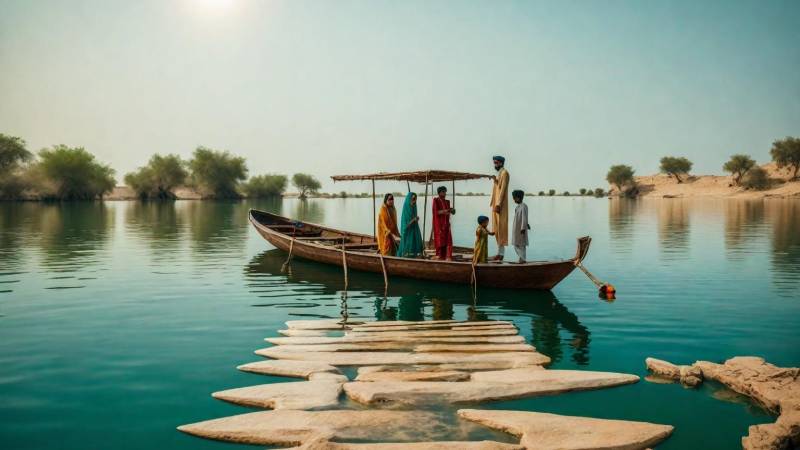
Literature, I believe, is now less ethereal and more earthly. While contemporary authors are stepping out of their bubbles or ‘ivory towers’ (to put it in literary terms) to address environmental concerns through their respective literary mediums of interest, senior authors who were already ahead of their time are being revisited, albeit with a sense of guilt stemming from the fear that it might be too late a re-perusal of their works, considering the environmental crisis which is no more an imminent phenomenon, but an extant one.
One of the sub-genres of environmental literature, or Green Studies as the British like to put it, is Blue Humanities, a field of academic scrutiny introduced around 2013 through John R. Gillis’s article titled The Blue Humanities and further expounded on through Routledge’s 2023 publication by the name of An Introduction to the Blue Humanities.
Blue Humanities, allotted to the treatment of water in literature, resembles its preceding sister subjects in a manner that as the ecosystem in Eco-critical Studies is not merely looked at as a poetic actant or a beautifying landscape in stories but also as an entity with its own set of processes and requiring proper, separate attention, water in Blue Humanities is not just a healer or a cleanser. Blue Humanities demands that water be looked at as a source of life subjected to the maltreatment of humans for centuries now, as an element that is as much taken for granted as it is important for life to continue and for communities to survive.
Blue Humanities brings into its ambit science by seeing how the various properties of water are and have been attended to, history by seeing how water usage or its presence or absence has developed cultural practices, sociology by seeing how water connects humans, and geography by seeing which terrains lakes, rivers and seas cover. It finally connects all of them with literature in the manner that science, history, sociology and geography are merged together to see how, from different regions, different characters emerge for literary narratives, influenced by and influencing the water flowing near or around them, or under their feet, also giving them an identity that is shaped definitely, if not largely, by water.
Since one of the pressing concerns of Pakistanis is that of identity, literature and environment come together, as Shazia Rahman also argues, to solve this issue by positing an identity that has more to do with geography and less to do with language and dressing. If this argument is heeded to, and water, flora and fauna are treated as identity markers, then much of the identity issue is resolved, as each regional community can argue for its identity based on the water-bodies it holds near to it, and at large.
Working in this field may not only resolve the issue of identity, but that of Pakistan’s environmental catastrophe as well
This brings me to the main point of this essay, that of the need for Pakistanis to struggle for an identity that is not language-bound and hence continues to be a point of conflict, but for an identity connected to the kind of water-bodies that exist in Pakistan. It won’t be wrong to say that Pakistan is essentially a fluvial land, with Karachi’s sea, Punjab’s rivers and Khyber Pakhtunkhwa’s numerous lakes being there. This ample availability of water in Pakistan, regardless of whether it will continue to be the state in future or not, can help the Pakistani literati weave post-colonial stories of their kind, with water as the identity-marker.
Critics and readers, on the other hand, can revisit already written stories by the likes of Intizar Hussain and Mustansar Hussain Tarar (which they are doing but not on an international level) to see how the intellects talked about the environment decades ago. Yes, scholars like Shazia Rahman, through critical analysis of Pakistani films and novels, and authors like Amna Mufti, through fictional works, have openly talked about the need to save the environment and extract an identity out of it, but when it comes to publications catering to the global audience, Pakistani waters hardly find a place in them, be it the journal Hydro-criticism published in 2018, or the Routledge publication mentioned earlier. Authors like Arundhati Roy, Amitav Ghosh and Salman Rushdie, all of Indian origin, however, do find their places in these critical works mentioned.
Considering that Blue Humanities is but a recent academic phenomenon, there is still much work scope for both the researchers and writers of Pakistan, and thereby for the general public of Pakistan for which the problem of identity remains an ever-lasting one. Working in this field may not only resolve the issue of identity, but that of Pakistan’s environmental catastrophe as well. With the literati’s sensitive personalities’ efforts to address environmental concerns through creative writing going hand in hand with the practical work of the scientific-minded ones, a beautiful balance might be created, targeted not only at the creation of a society that is scientifically at par with the world, but also at the creation of a society that is equally conscious about the important, non-human entities, be they water-bodies, plants or animals.

